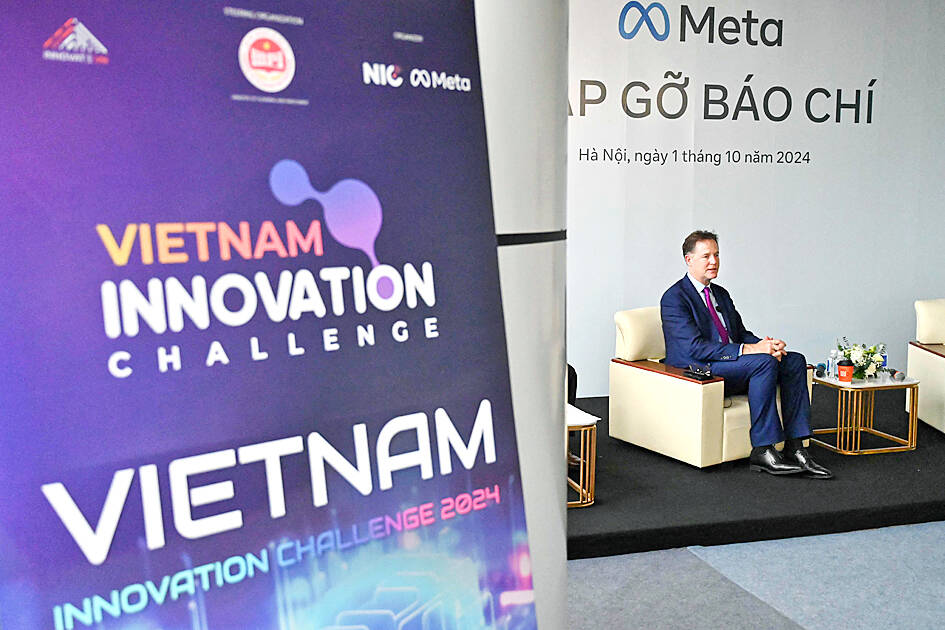Facebook parent Meta Platforms Inc will produce its next-generation virtual reality and augmented reality headsets in Vietnam, creating more than 1,000 jobs, the company said yesterday.
Speaking at a tech conference in Hanoi, Meta president of global affairs Nick Clegg said that the firm would focus on the production of the Quest 3S headset in the Southeast Asian country.
“We will, with our local partners, be manufacturing them here in Vietnam, and we estimate that this will create well over 1,000 new jobs,” he said.

Photo: AFP
Vietnam — long a low-cost destination to make clothes, shoes and furniture — is eyeing a rapid climb up the global supply chain.
The Vietnamese government last week said that Elon Musk’s SpaceX plans to invest US$1.5 billion in the country.
Vietnam is particularly intent on developing its capabilities in the lucrative chip industry, with global supply chain shocks and fears about US reliance on China for key resources boosting investment there.
Facebook is widely used in Vietnam and Clegg said the nation was among the global leaders in using its Messenger platform “not just to send messages to family and friends, but actually communicate with businesses and so foster trade and commerce across the country.”
However, Facebook has also faced criticism from human rights groups in the past few years for blocking content deemed illegal by the country’s government.
Facebook is a popular platform for rights advocates in Vietnam, where all independent media are banned.

CHIP RACE: Three years of overbroad export controls drove foreign competitors to pursue their own AI chips, and ‘cost US taxpayers billions of dollars,’ Nvidia said China has figured out the US strategy for allowing it to buy Nvidia Corp’s H200s and is rejecting the artificial intelligence (AI) chip in favor of domestically developed semiconductors, White House AI adviser David Sacks said, citing news reports. US President Donald Trump on Monday said that he would allow shipments of Nvidia’s H200 chips to China, part of an administration effort backed by Sacks to challenge Chinese tech champions such as Huawei Technologies Co (華為) by bringing US competition to their home market. On Friday, Sacks signaled that he was uncertain about whether that approach would work. “They’re rejecting our chips,” Sacks

NATIONAL SECURITY: Intel’s testing of ACM tools despite US government control ‘highlights egregious gaps in US technology protection policies,’ a former official said Chipmaker Intel Corp has tested chipmaking tools this year from a toolmaker with deep roots in China and two overseas units that were targeted by US sanctions, according to two sources with direct knowledge of the matter. Intel, which fended off calls for its CEO’s resignation from US President Donald Trump in August over his alleged ties to China, got the tools from ACM Research Inc, a Fremont, California-based producer of chipmaking equipment. Two of ACM’s units, based in Shanghai and South Korea, were among a number of firms barred last year from receiving US technology over claims they have

Taiwan’s exports soared 56 percent year-on-year to an all-time high of US$64.05 billion last month, propelled by surging global demand for artificial intelligence (AI), high-performance computing and cloud service infrastructure, the Ministry of Finance said yesterday. Department of Statistics Director-General Beatrice Tsai (蔡美娜) called the figure an unexpected upside surprise, citing a wave of technology orders from overseas customers alongside the usual year-end shopping season for technology products. Growth is likely to remain strong this month, she said, projecting a 40 percent to 45 percent expansion on an annual basis. The outperformance could prompt the Directorate-General of Budget, Accounting and

BARRIERS: Gudeng’s chairman said it was unlikely that the US could replicate Taiwan’s science parks in Arizona, given its strict immigration policies and cultural differences Gudeng Precision Industrial Co (家登), which supplies wafer pods to the world’s major semiconductor firms, yesterday said it is in no rush to set up production in the US due to high costs. The company supplies its customers through a warehouse in Arizona jointly operated by TSS Holdings Ltd (德鑫控股), a joint holding of Gudeng and 17 Taiwanese firms in the semiconductor supply chain, including specialty plastic compounds producer Nytex Composites Co (耐特) and automated material handling system supplier Symtek Automation Asia Co (迅得). While the company has long been exploring the feasibility of setting up production in the US to address